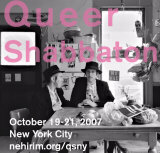 March 06
March 06
Flakes
Jay Michaelson

I hate when people don't call back. As a writer, I deal with rejections all the time; it's part of the business. But the non-returned emails, the promised phone calls that never come -- these are the worst. Really, I see them as a form of cowardice: it's easier to ignore someone than to tell them you don't want them, or don't want to offer them the help you'd promised. Maybe it's just disrespect.
I work in several fields: I am a writer, a graduate student, an editor, an attorney, and the head of two nonprofit organizations. It's not unusual for me to rush home from a class on the erotics of the Zohar in order to get to a conference call about open source software. As a result, I work within many different discursive communities, some businesslike and by-the-book, some languid and emotional. I have to watch myself, as I move between them, to ensure that I'm serious and professional sounding in the software business and "spiritual" sounding in the Kabbalistic one -- and not vice versa.
I've noticed that the overwhelming majority of unreturned phone calls, unanswered emails, and cancelled plans that I experience come not from the supposedly cruel world of business, but from the spiritual and artistic types -- people (and institutions) who produce "spiritual" literary products, create "soulful" events... and routinely drop the ball, change plans in the middle, and leave their partners hanging. On one level, this phenomenon should not be surprising. Of course, people who are interested in Kabbalistic chant are going to be flakier than those interested in making money in the high-tech world, and the institutions they create will be no less flaky.
Yet flaking isn't only dropping the ball; it's also exquisitely selfish, since it ignores the unkindness and unfairness that flaking out represents. It's narcissistic, and egotistic, since it brushes off other people as soon as the attention is elsewhere. Isn't spiritual work supposed to make one kinder, and more considerate of others -- rather than so self-involved that flaking out on others is a part of daily life?
The reason I've scarequoted words like "spiritual" and "soulful" is that, as I've written in previous columns, these words mean very different things for different people. For one, it may mean studying text; for another, leaving text behind and working in the body. For one, it may mean "witnessing" more clearly whatever is happening in ordinary life; for another, it may mean deliberately creating an environment, or state of mind, that is contrapuntal to ordinary life. And while for one person, spirituality may be intimately involved with the cultivation of ethics and consideration, for many others, it is essentially self-involvement, in which other people are asked to understand that one is in this or that journey, or process, or whatever.
That's what's interesting about spiritual flakes -- not that they are irritating, but that they are ideological. Because, far more interesting than the petty annoyance of flakes is how their doing so reflects a distinctive ideology of spiritual practice, which values softness, relaxing, and "being in the moment." I want neither to complain about flakes, nor to condemn them, nor, really, to exclude myself from them, as my inner flake often runs my life. It's possible that a world with too many flaky liberals would be much less violent than one with too many tough, mean conservatives. Beyond personality type, what are the philosophical beliefs that underlie spiritual flakiness? How do they grow, and diverge, from contemplative traditions? And would we all be better off if we were flakier?
1. Turn the hate around
There is no point in denying that much of the flakiness of "spiritual" people derives not from ideology but from personality. Just as some people are better at math, some personalities are just more temperamentally suited to exploring feelings in a group setting, holding hands and singing, and intuiting imbalances of energy fields than others. In my experience, they are also likely to be more suited to myth (not in the sense of something untrue; rather, a narrative which speaks to the soul on a level deeper than fact) and to the belief that true wisdom lies not in books but in accessing the stirrings of the soul. Spirituality is often imprecise, intuitive, and not amenable to rigorous, rational inquiry, and some people just prefer that. Maybe this proclivity is genetic; maybe it results from environment. Maybe, as some cynics like to say, it results from an inability to experience love, meaning, and self-acceptance through more conventional methods.

Of course, there is nothing wrong with the non-rational. As I wrote several years ago in an essay on "Energy," there is obviously quite a lot in the observable world that does not conform to rational or scientific categories; while perhaps the precise maps of chakras, ch'i, and the rest may be incorrect, the phenomena that they describe are real, and skepticism is often less scientific than a form of emotionally-grounded willful blindness. Moreover, even if one day we will understand, in a scientific way, the neurophysiology of love -- would one think that a life well lived is one that reduces love to neurons? Surely not. The intuitive, the imprecise, and the emotional not only have their place; they may have a central place in the actual lived experience of a well-developed human being.
Personally, I've come to believe that cultivating the flaky mode of spiritual and emotional openness is as important to living fully as cultivating the intellect or the body. There are no prestigious degrees for being able to cry in front of strangers. But as someone who has worked (and obtained) both the degree and the ability, I think maybe there ought to be. An integrated life means developing the self in all of its faculties, pursuing "emotional excellence" as seriously as intellectual, or financial, excellence. And it isn't easy.
In the "square" world, however, the spiritual proclivities of flakes are often chalked up not to a talent for spirituality but to the flakes' own emotional or intellectual inadequacies. I remember early on in my practice, how I used to judge the array of misfits who would come to spiritual retreats. Here we are, I would think, a bunch of weirdos, freaks, and malcontents, being told by our bearded teachers that we were God incarnate, or that we were the vanguard of humanity's spiritual awakening, or whatever. Sure. Eventually, what I came to see was that the weirdos and freaks were little different from the socially inept people who staff university philosophy departments, or the emotional infants who are partners at major law firms. Just as the partner's temper tantrum doesn't invalidate his legal brilliance, so too does the weirdo's weirdness not undermine her genuine spiritual insight.
But this is not the view one generally receives in elite publications like The New Yorker or at the right kind of cocktail parties. There, one hears that spirituality is pure delusion.
Perhaps because of the scorn with which the mainstream treats spiritual development, spiritual types tend to make their own mistake in return. Excluded by a world which regards spirituality as worthless, many of them regard the rest of the world as worthless. The professor of Kabbalah thinks the practitioners are deluded; the practitioners think the professor is missing the entire point. The medical doctor thinks the holistic healer is dangerously misguided; the holistic healer thinks the same of the doctor. Marginalized, criticized, and relentlessly mocked by the cynical, often-blind, and often highly cruel mainstream world, one can hardly blame the spiritual set for turning the hatred around on them.
And then, because values such as punctiliousness, steadfastness, and goal-orientation are symptomatic of mainstream consciousness, they too come under withering critique by spiritual people. Relax; get in touch with your deeper self; stop worrying so much; stop being a "human doing" and just be a "human being." These are pronouncements one hears all the time, not just in the New Age, but even within more mainstream religious and social action settings. Punctuality is a symptom of mechanization, of digital watches and calendars. Seeing a project through to its end may often be "unhealthy for me right now." If the trains are running on time too much, something has probably gone wrong.
A curious paradox then results: flakes simultaneously condemn the faculty of judgment, and judge people they perceive to be judgmental. This happens both individually and communally, in what Don Beck, Ken Wilber and others have called the "green meme" of human (and societal) development. The green meme is an advanced mode of human thought and development which values pluralism, listening, sitting in circles, and non-judgment. It is essential, and enlightened; it is the source of feminism's reaction against patriarchy, of pacifism's response to violence, and of democracy's response to dictatorship. Without the green meme, we are doomed.
But the green meme also tends to be blind, not seeing that it, itself, is in a hierarchical relationship to that which came before -- because hierarchy, characteristic of the previous stages of human development, is its great enemy -- and not acknowledging how important those previous stages still are. Without collaboration, cooperation, and some measure of egalitarianism, we will destroy ourselves. But with only the green meme, we don't get anywhere at all. Once all judgment is suspect, even distinctions that most green-memers want to make -- gentleness is better than oppression, openness is better than prejudice -- become very difficult to justify. Everything gets processed, but nothing gets done.
In the world of the green meme, flakiness is raised to an ethical value. Always answering emails? Too much linear thinking. Running four hours late to a gathering, as certain much-beloved spiritual rabbis used to do? A sign of good priorities, and an opportunity for the rest of us to turn off the scheduler and sing a little more. Green-meme flakes love that infrastructure in India doesn't really work, because you have to relax and let life unfold the way it's meant to unfold. They are suspicious of trying too hard to accomplish something, because the journey is the destination, and the process is more important than the product.










